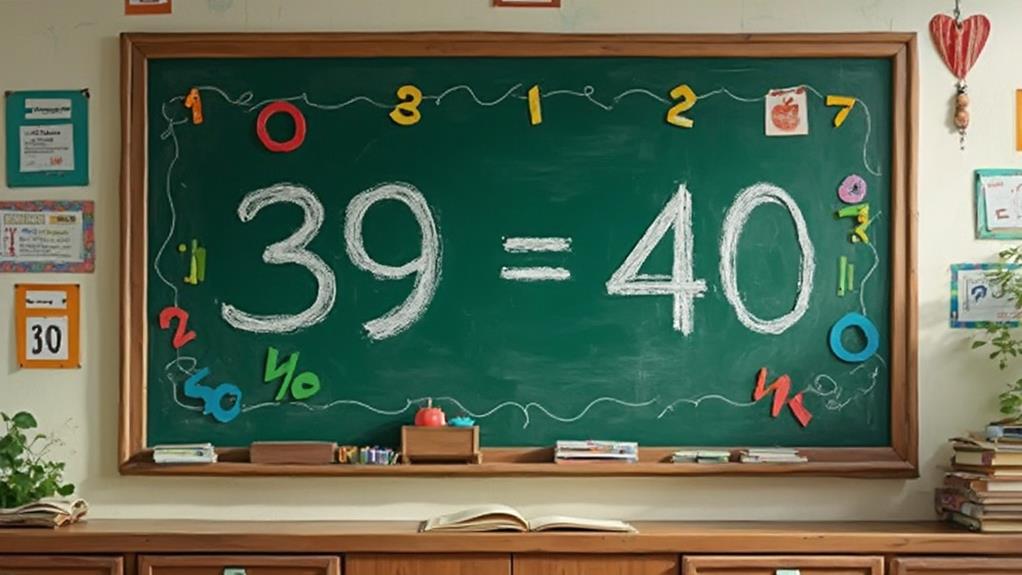When you spell the number 40, you might be tempted to write "fourty," but the correct spelling is "forty." This form has been standardized since the 18th century, yet it's easy to see why "fourty" seems logical, given the presence of "four." Understanding the historical background and common mistakes can help you remember the correct spelling. What might surprise you is how linguistic shifts over time have solidified "forty" as the accepted form, despite its seeming inconsistency. Let's explore these shifts and uncover some helpful memory aids to guarantee you never misspell 40 again.
Correct Spelling of Forty
When it comes to spelling the number 40, there's only one correct way: "forty." This standard spelling has been universally accepted in both British and American English since the 18th century.
The correct spelling of forty might seem puzzling, especially when you consider its linguistic relatives like "four," "fourteen," and "four hundred," all of which contain the letter "u." Yet, "forty" doesn't follow this pattern.
The term "forty" derives from the Old English "feowertig," meaning "four tens." The etymological evolution led to the dropping of the "u," which has been the accepted form for centuries. Before the 18th century, "fourty" was a common variation, but it has since fallen out of favor.
Dictionaries, including Merriam-Webster and the Oxford English Dictionary, confirm that "forty" is the only correct spelling, with no recognized alternatives.
Understanding the correct spelling of forty helps you use precise language. It's a subtle way to demonstrate your attention to detail and adherence to established norms, fostering a sense of belonging within educated circles.
Historical Background
In understanding the historical background of the word "forty," it's essential to recognize how its spelling has evolved over time. The term "forty" as we understand it started to solidify in Modern English around the 15th century. Before this period, you would've encountered variations like "fourty" and "fourtie." These earlier forms reflect the fluid nature of English spelling during that era.
The journey of "forty" didn't stop there. Historical variations such as "vorty" and "fourtye" appeared but gradually fell out of favor by the 18th century. It was around this time that "forty" began to gain traction, thanks in part to its use in common phrases like "forty winks." By the 19th century, the Oxford English Dictionary had confirmed "forty" as the standard spelling.
Tracing its roots even further back, "forty" originates from the Old English "feowertig," literally translating to "four tens." This compound word underscores the arithmetic foundation of the term.
Today, "forty" is universally accepted in both British and American English, with no alternative spellings recognized. Understanding this historical context helps you appreciate the stability and acceptance "forty" enjoys in contemporary usage.
Common Spelling Mistakes
You might be tempted to spell 40 as "fourty," but that's a common mistake rooted in historical variations and phonetic patterns.
In the 18th century, "fourty" was more prevalent, but modern usage has standardized "forty" without the "u."
Understanding this linguistic quirk can help you avoid errors, especially in precise contexts like financial documents.
Common Misspelling Variants
Confusion often arises around the correct spelling of 40, leading to the prevalent mistake of writing "fourty." Despite the phonetic resemblance to numbers like "thirty" and "twenty," "forty" drops the "u," a pattern that diverges from the norm and trips up many writers. This common misspelling, "fourty," is frequently encountered in casual writing, where the expectation of consistency with other numerals can mislead you.
Understanding why "forty" deviates from the anticipated pattern requires a bit of etymological insight. Historically, the spelling "fourty" was indeed used until the 18th century. However, modern English has since standardized on "forty," a shift that has left many unaware of the correct form. Spell-check tools and dictionaries universally flag "fourty" as incorrect, reinforcing the importance of using "forty" in your writing.
Misunderstandings around the spelling of 40 often stem from a lack of awareness about this unique spelling pattern. By recognizing this exception and using resources like dictionaries and spell-check tools, you can avoid common pitfalls.
Historical Spelling Evolution
Although the spelling "fourty" was commonly used until the 18th century, the eventual change to "forty" marked a significant evolution in the English language. This alteration is a fascinating case of linguistic change driven by vowel shifts and standardization efforts. Initially, variations such as "fourtie" and "fourtye" reflected the fluid nature of English spelling conventions.
As the language evolved, "fourty" gradually fell out of favor, and "forty" became the standard. This change isn't arbitrary; it aligns with broader vowel shifts that took place during the development of Modern English. Despite the historical presence of "fourty," modern dictionaries and linguistic authorities now universally endorse "forty" as the correct spelling.
You might wonder why "fourty" still pops up in writing today. Often, it's because of phonetic similarities with other numbers like "thirty." This can create confusion, leading to the common misconception that "fourty" might be correct.
However, adhering to "forty" not only aligns you with historical accuracy but also with current standardized English usage. Embracing "forty" connects you with the rich, evolving tapestry of the English language, ensuring clarity and correctness in your writing.
Linguistic Quirks Explained
Steering through the complexities of English spelling can often feel like deciphering a linguistic puzzle, particularly with words like "forty." Despite its straightforward appearance, "forty" is frequently misspelled as "fourty," a common error rooted in phonetic resemblance to other numbers such as "thirty." This discrepancy highlights the idiosyncrasies of English spelling conventions, where historical evolution and vowel shifts have shaped the language we use today.
The correct spelling of the number 40 is "forty," while the common misspelling "fourty" lacks historical support and is considered incorrect in modern usage. The absence of the letter "u" in "forty" creates confusion that leads many to mistakenly use "fourty."
Curiously, the spelling "fourty" was once prevalent in English until the 18th century, but it has since fallen out of use, replaced by the universally accepted "forty."
These linguistic quirks in English, such as the unique spelling of "forty" and its ordinal form "fortieth," underscore the complexities of English spelling conventions. Educators often emphasize recognizing spelling errors like "fourty" to improve writing accuracy and comprehension in both academic and professional contexts.
Understanding these quirks can enhance your grasp of English spelling and boost your confidence in written communication.
Linguistic Insights
You're likely curious about why "forty" lacks the "u" found in "four."
Historically, "fourty" was used until the 18th century, but the shift to "forty" reflects the English language's evolution, rooted in the Old English "feowertig."
This unique spelling characteristic underscores the irregularities in English, where similar numbers like "fourteen" retain the "u."
Unique Spelling Characteristics
In examining the unique spelling characteristics of the number "forty," we uncover a linguistic anomaly that has puzzled scholars for centuries. Unlike its numerical counterpart, "four," the spelling of "forty" excludes the letter "u." This distinction isn't merely a modern quirk but represents a deeper lexical curiosity.
- Phonetic Discrepancy: Although "forty" phonetically aligns with "fourty," the latter spelling has fallen out of use since the 18th century. This divergence lacks a clear historical rationale, making "forty" an ill-formed yet accepted standard.
- Pattern Deviation: Examining similar numerals such as "thirty" and "fourteen," you notice that "forty" breaks the typical inclusion of "u." This deviation is unique, as it doesn't follow the expected linguistic patterns.
- Ordinal Form Consistency: The ordinal form "fortieth" also omits the "u," reinforcing the distinct spelling of the base number. This consistency in the absence of "u" across forms highlights a deliberate, albeit opaque, lexicographical decision.
Understanding the unique spelling characteristics of "forty" helps you recognize the complexities and inconsistencies within the English language, fostering a deeper appreciation for its intricate evolution.
This nuanced analysis connects you to a broader linguistic community that values precision and historical insight.
Historical Spelling Variations
During the evolution of the English language, the spelling of "forty" underwent several transformations before settling into its current form. Historically, "fourty" was a common spelling up until the 15th century. You'd also find variations like "fourtie," "fourtye," and even "vorty" as the language developed. These changes were influenced by significant vowel shifts that redefined many English words.
By the 1800s, "forty" started gaining popularity, particularly in idiomatic expressions such as "forty winks." This shift towards "forty" coincided with a broader movement towards standardization in English spelling. Dictionaries and linguistic authorities began to universally recognize "forty" as the correct form, rendering "fourty" obsolete and incorrect.
Understanding these historical variations gives you a richer perspective on how dynamic our language is. The journey from "fourty" to "forty" reflects broader linguistic trends and the subtle art of standardization that shapes our shared vocabulary.
English Language Evolution
Exploring the historical spelling variations of "forty" offers a fascinating glimpse into the broader patterns of English language evolution. As English shifted from Middle to Modern English, spelling conventions underwent significant changes. The coexistence of "fourty" and "forty" until the 18th century mirrors these shifts, with "forty" eventually prevailing due to changes in vowel pronunciation.
These linguistic shifts reveal several key insights:
- Irregularities in Spelling: Unlike "four" and "fourteen," "forty" lacks the "u," a peculiarity emphasized by linguists like D.W. Cummings.
- Cultural Influences: Spelling changes often reflect broader cultural shifts and usage trends among speakers.
- Dynamic Nature of Language: The evolution of "forty" underscores the dynamic, ever-changing nature of language.
Understanding these variations helps you appreciate the complexity of English spelling. The acceptance of "forty" over "fourty" is more than a simple orthographic decision; it's a reflection of evolving pronunciation and cultural norms.
Memory Aids
Mastering the spelling of "forty" can benefit from a few strategic memory aids. One effective approach is to remember that "forty" lacks a "u," distinguishing it from "four." This difference is essential for helping students avoid the common mistake of writing "fourty." Associating the word "for" with "forty" serves as a useful mnemonic device, reinforcing the correct spelling in your mind.
Using common phrases like "forty winks" in everyday conversation can also solidify the spelling. The frequent repetition of these phrases helps embed the correct form in your memory.
Additionally, recognizing the ordinal form "fortieth" not only reinforces "forty" but also creates a mental link between the base word and its derivative, making it easier to recall.
To further enhance your familiarity with "forty," practice writing sentences that include the word. This hands-on approach reduces the likelihood of misspelling it as "fourty."
Additional Resources
Leveraging additional resources can greatly enhance your ability to spell "forty" correctly. Numerous online tools are available to guarantee you master the accepted spelling. Here are three essential resources to evaluate:
- Educational Websites and Platforms: Many grammar websites and educational platforms offer articles explicitly addressing common spelling mistakes. By reading these, you can internalize the correct form—"forty"—and avoid the common error of spelling it as "fourty."
- Interactive Quizzes and Games: Engaging in interactive quizzes and language games, such as crossword challenges, can reinforce the correct spelling of numbers. These activities not only make learning enjoyable but also improve your overall vocabulary and spelling skills.
- Dictionaries and Historical Contexts: Resources like the Merriam-Webster and the Oxford English Dictionary provide definitive guidance on spelling, confirming "forty" as the only accepted spelling.
Additionally, the Online Etymology Dictionary offers insights into the historical evolution of the word from "fourty," helping you understand and retain the correct usage.
Frequently Asked Questions
Is 40 Spelled Forty or Fourty?
For the correct forty pronunciation, always spell it as "forty," not "fourty." Spelling variations existed historically, but modern dictionaries agree on "forty." Understanding its unique etymology helps solidify this spelling in your mind.
How Do You Spell 40 on a Check?
When writing a check, spell 40 as "forty." Spelling tips include avoiding the common mistake of "fourty." Accurate spelling is essential to prevent misunderstandings and guarantee your check's validity. Double-check for consistency and clarity.
When Did Fourty Change to Forty?
Ever wondered when "fourty" became "forty"? The historical spelling changed in the 18th century due to linguistic evolution. This change reflected vowel shifts, standardizing "forty" and marking a key moment in English etymology.
How Do You Write 40 in Word?
To correctly write 40 in word form, you use "forty." Despite common misconceptions, "fourty" is incorrect. Understanding number representation and word variations helps you avoid mistakes. Embrace precise language; you belong to a knowledgeable community.







